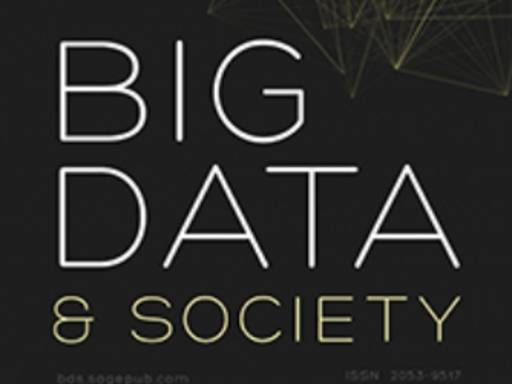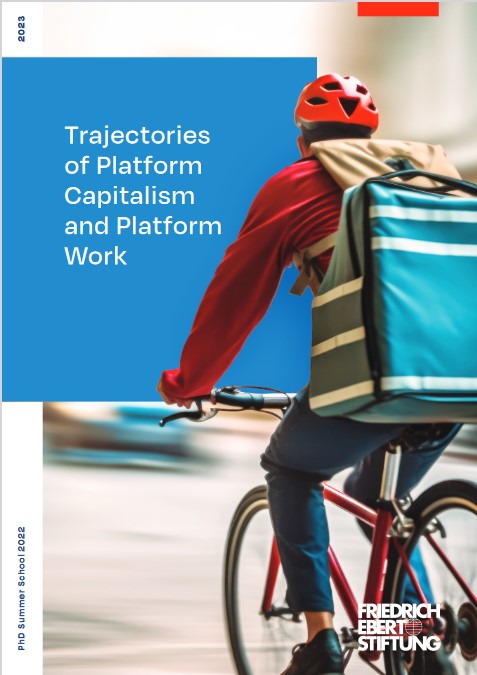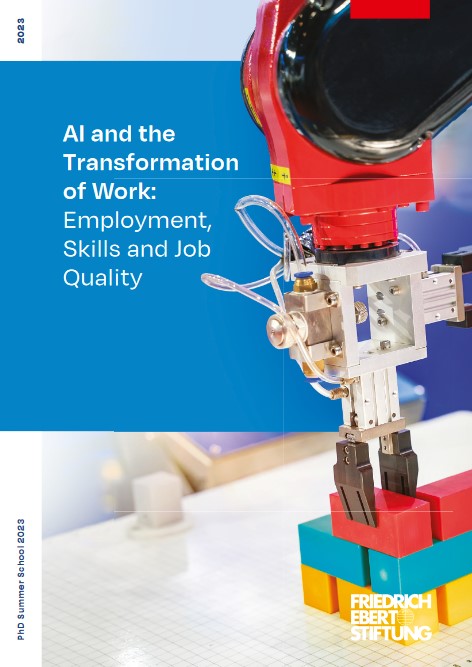Technology, Employment and Wellbeing
Technology, Employment and Wellbeing is a new FES blog that offers original insights on the ways new technologies impact the world of work.
The blog focuses on bringing different views from tech practitioners, academic researchers, trade union representatives and policy makers.
2024/ Issue 3
Workplace Automation: Optimisation, Anxiety and Job Satisfaction

In our third issue of the Technology, Employment and Wellbeing blog, we would like to look at the ways automation technologies (such as artificial intelligence, big data analytics or robotics) not only change the content of many jobs but also can alter career paths for the millions of workers in the near future.
The debates about the nature of technological progress and its effects on economy and society are not new. Already in the 1940s, Schumpeter in his theory of ‘creative destruction’, argued that technological innovations are implicit in business cycles and inevitably lead to economic growth and improved standards of living.
However, in recent years, the academic and public discussions on the impact of automation on the world of work have been largely polarized with the views ranging from the dystopian projections of job-killing robots to techno-optimistic vision of post-work future with workers being emancipated from the drudgery of work.
The articles in this issue focus on interrelated societal processes in which workers negotiate new meanings and practices through the use of new technologies in the workplace. In the first two articles, Joel Christoph argues that digital transition needs a thoughtful and understanding approach from decision-makers that considers not only economic effects, but also social and psychological consequences; while Zuzanna Kowalik focuses on growing importance of social skills in the labour market, including emotional intelligence.
Similarly, Athina Fatsea looks at the evolution of skills and competences required to perform translations by highlighting the importance of looking at the job satisfaction within the debates on automation.
However, Yin Liang and Srravya Chandhiramowuli take a more critical stance on the automation debates by zooming in on the worker’s autonomy in the sectors in which either the creative output or manual micro tasking is managed by algorithms.
2024/Issue 2
Platform Work Rulebook
In our second issue of the Technology, Employment and Wellbeing blog, we would like to acknowledge an important milestone in the labour protection for the EU workers in the gig/platform economy.
After more than two years of negotiations, the platform work directive has been adopted on 11 March, 2024. The Directive provides important legal provisions on the rights of misclassified workers and automated decision-making systems in the workplace used by platform companies.
However, in realising a fairer future of platform work in Europe, numerous issues that are crucially intertwined with the functioning of the platform economy infrastructures, such as taxation, subcontracting and algorithmic design are still to be addressed in the upcoming years, when a patchwork of national regulations on platform work is more likely to emerge.
In the first two articles of this issue, Ben Wray and Oliver Philipp provide an overview of the challenges and uncertainties surrounding the adopted text of the platform work directive as well its upcoming implementation.
While the presumption of an employment relationship for platform workers has been widely discussed in the last few years, Franziska Baum in her article, questions why there has been a strong preference for self-employment for many workers in the care sector.
Padmini Sharmaand Delia Badoi look at migrant platform workers for whose employment status re-classification might not translate into stronger and greater social protection.
In the last article of this issue, Barbara Švagan discusses why many workers in precarious working conditions, find their “dirty jobs” meaningful and satisfying.
2024/Issue 1
New Directions
In our first issue of the Technology, Employment and Wellbeing blog, we would like to present several thought-provoking posts that look on distinct areas of digitalization of work.
In recent years, most of the policy debates have been focusing on negative effects of digitalization on work organization and worker’s wellbeing raising ethical concerns on the way new technologies are used and misused in a workplace in the first place. There is no doubt, that the datafication and ‘platformisation’ of social processes leads to the transformative implications for labour relations and job quality. However, in understanding the causes and consequences of the fragmentation of labour markets, it is important to critically examine and engage in new ways of bridging the gap between academic research, policy and practice.
In the first article of this issue, Dr. Niels van Doorn zooms in on this new form of work by looking beyond the debate of exploitative bogus-self-employment and the black box of algorithmic management. In particular, the authors highlight the underlying asymmetries of the digital economy in Europe and the need to expand research as well policy focus in the process of regulating emerging sectors of gig work that increasingly becomes migrant work.
In continuing discussion on migrant workers, Dr. Kostas Maronitis looks at the interlinkage between automation and migration policies that on the one hand expressed with a political backlash against immigration and fear of low productivity on the other hand.
Dr. Cecilia Rikap focuses on the emergence of intellectual monopolies, as the Big Tech corporations develop and transform knowledge within the society by subordinating AI start-up infrastructures through the cloud services.
However, within the multi-billion-dollar industry, thousands of ‘ghost’ workers are training AI algorithms. The researcher from Fairwork closely examine the working conditions in the supply chains of AI and whether change is possible for data workers.
Finally, Benjamin Ferschli assesses the limits of a universal basic income as progressive social policy arguing that the implementation of a universal basic income can potentially lead towards exclusionary and polarising effects.
Contact person
Dr. Inga Sabanova
Policy Officer
Friedrich-Ebert-Stiftung
Future of Work
Cours Saint Michel 30a
1040 Brussels
Belgium











